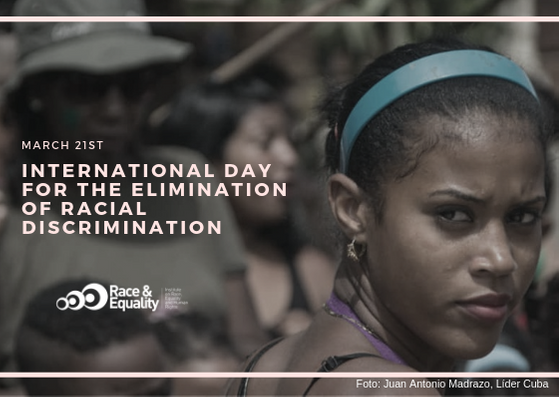Race and Equality Recognizing the International Day for the Elimination of Racial Discrimination
Message from Carlos Quesada – Executive Director Institute on Race, Equality and Human Rights Today, March 21st, we again commemorate the International Day for the Elimination of Racial Discrimination. In observing […]

Message from Carlos Quesada – Executive Director Institute on Race, Equality and Human Rights
Today, March 21st, we again commemorate the International Day for the Elimination of Racial Discrimination. In observing what is happening in the world and in our continent, I can only think about how discrimination, racism, xenophobia, and intolerance are gaining ground. They are highly present in the media, in politics, in our societies and in our daily lives. Fighting for the elimination of all forms of discrimination, xenophobia, homophobia, and intolerance is one of the fundamental pillars to promote social cohesion, the right to live, and diversity.
I want to call attention to the fact that in our continent, only three countries have ratified the Inter-American Convention Against Racism, Racial Discrimination, and Related Intolerance: Costa Rica, Uruguay, and Antigua and Barbuda. It is imperative that the rest of the States in the region truly assume the commitment to combat, punish, and eliminate this scourge that eats away at our societies. We urge States to sign and ratify this important Inter-American instrument, especially as a part of the Action Plans they should develop during the International Decade for People of African Descent (2015 – 2024).
We cannot allow Afro-descendants in the Americas to continue being the most marginalized populations and the most affected by the structural racism that is reflected in few state investments, high rates of illiteracy, under-representation in decision-making bodies, and under-representation within the system of administration of justice. Young Afro-descendants continue to be victims of racial profiling and police brutality. Afro-descendant women continue to have little access to health and education, which perpetuates high levels of poverty.
States are preparing to begin a new census round (2020) where we hope not only to have quanitifiable data on how many Afro-descendants there are, but also on the socioeconomic conditions of these populations. States must use this data to make a better use of their resources and invest in the most impoverished areas, which coincide with the areas in which Afro-descendants live.
In this second decade of the 21st century, it has become clear that Afro-descendants, thanks to their resilience, expect more than good intentions: they expect real structural changes. More Afro-descendant academics, politicians, professionals, and businesspeople have demonstrated not only the contributions they have made to their countries, but also that they are part of, have built, and will continue to build the identities of the countries where they live, from Canada to Argentina. This is true whether they are called black, African-Americans, Afro-latinos, palenqueros, raizales, o pretos!
From Race and Equality, we will continue to make visible, combat, and denounce the scourge of racial discrimination and other related forms of intolerance together with our partners in the hemisphere, who with their experience and struggle have made progress at both the national and international level.

